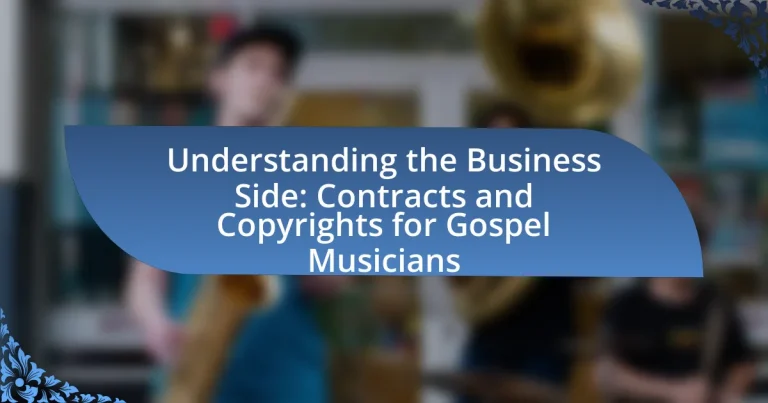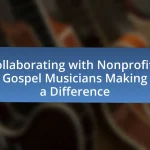The article focuses on the essential aspects of contracts and copyrights for gospel musicians, emphasizing the importance of understanding these legal frameworks to protect their creative and financial interests. Key topics include the structure of contracts, the rights they confer, and how they can prevent disputes among musicians. Additionally, the article outlines various types of contracts, such as recording and performance agreements, and discusses the significance of copyright in safeguarding original works. It also provides practical advice on negotiating contract terms, identifying potential red flags, and managing business affairs effectively, ensuring gospel musicians are well-informed in navigating the complexities of the music industry.
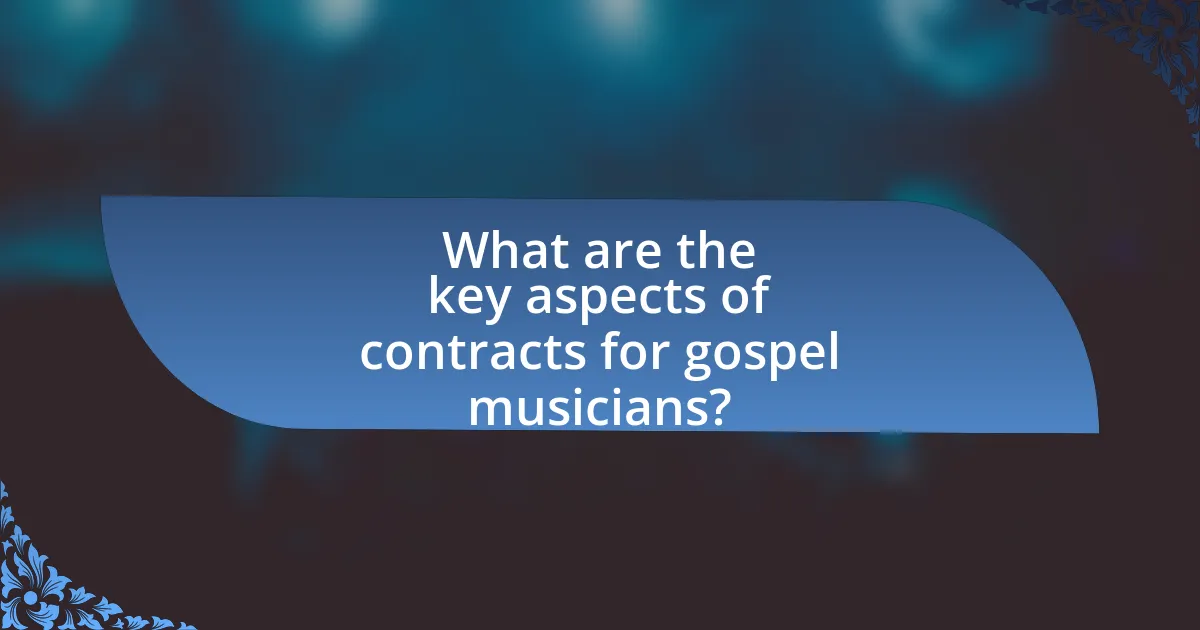
What are the key aspects of contracts for gospel musicians?
The key aspects of contracts for gospel musicians include terms related to royalties, performance rights, and ownership of intellectual property. Contracts typically outline how revenue from music sales, streaming, and performances will be shared, ensuring that musicians receive fair compensation for their work. Additionally, they specify the rights to use the music in various contexts, such as licensing for films or commercials. Ownership clauses clarify who holds the rights to the music created, which is crucial for future revenue opportunities. These elements are essential for protecting the financial and creative interests of gospel musicians in the competitive music industry.
How do contracts protect the rights of gospel musicians?
Contracts protect the rights of gospel musicians by legally defining the terms of their work, including ownership of intellectual property, payment structures, and distribution rights. These agreements ensure that musicians receive fair compensation for their creative output and establish clear guidelines for how their music can be used by others. For instance, a contract may specify that a musician retains copyright over their songs, preventing unauthorized use or reproduction. Additionally, contracts can include clauses that protect against exploitation, ensuring that musicians are credited and compensated for their contributions. This legal framework is essential for safeguarding the interests of gospel musicians in a competitive industry.
What specific rights are typically included in a contract?
Contracts typically include specific rights such as the right to receive payment, the right to use intellectual property, and the right to terminate the agreement under certain conditions. These rights ensure that parties involved in the contract are protected and can enforce their interests. For instance, the right to receive payment guarantees that one party will be compensated for their services or goods, while the right to use intellectual property allows for the legal use of creative works, which is particularly relevant for gospel musicians. Additionally, the right to terminate the agreement provides a mechanism for parties to exit the contract if certain obligations are not met, thereby safeguarding their interests.
How can contracts prevent disputes among gospel musicians?
Contracts can prevent disputes among gospel musicians by clearly outlining the rights, responsibilities, and expectations of each party involved. By specifying terms such as payment, performance obligations, and ownership of intellectual property, contracts minimize misunderstandings that can lead to conflicts. For instance, a well-defined contract can stipulate how revenue from music sales or performances is to be shared, thereby reducing the likelihood of financial disputes. Additionally, including clauses for conflict resolution can provide a structured approach to addressing disagreements, further preventing escalation into disputes.
What types of contracts should gospel musicians be aware of?
Gospel musicians should be aware of several types of contracts, including recording contracts, publishing agreements, performance contracts, and management contracts. Recording contracts outline the terms between the artist and the record label, detailing rights, royalties, and obligations. Publishing agreements govern the rights to the music compositions, ensuring that songwriters receive compensation for their work. Performance contracts specify the terms for live performances, including payment, venue details, and cancellation policies. Management contracts establish the relationship between the artist and their manager, outlining responsibilities and commission rates. Understanding these contracts is crucial for gospel musicians to protect their rights and ensure fair compensation in the music industry.
What is a recording contract and how does it work?
A recording contract is a legal agreement between an artist and a record label that outlines the terms of recording, distribution, and promotion of the artist’s music. This contract typically specifies the rights and obligations of both parties, including the duration of the agreement, financial arrangements such as advances and royalties, and the scope of the label’s control over the artist’s work. For example, a standard recording contract may grant the label exclusive rights to distribute the artist’s music while providing the artist with a percentage of sales revenue. Such contracts are essential in the music industry as they establish the framework for the business relationship, ensuring that both the artist and the label understand their respective roles and responsibilities.
What are performance agreements and why are they important?
Performance agreements are formal contracts between performers and event organizers that outline the terms of a performance, including payment, duration, and specific requirements. These agreements are important because they establish clear expectations and responsibilities for both parties, reducing the risk of misunderstandings and disputes. For instance, a study by the International Association of Venue Managers highlights that well-defined performance agreements can lead to smoother event execution and higher satisfaction rates among both performers and organizers.
How can gospel musicians negotiate better contract terms?
Gospel musicians can negotiate better contract terms by thoroughly understanding their rights and the industry standards. Knowledge of copyright laws and typical contract clauses empowers musicians to advocate for fair compensation, creative control, and ownership of their work. For instance, the U.S. Copyright Act grants musicians rights over their original compositions, which can be leveraged during negotiations to secure better terms. Additionally, seeking legal advice or representation can provide insights into common pitfalls and help in drafting contracts that protect their interests.
What strategies can be used for effective negotiation?
Effective negotiation strategies include preparation, active listening, and creating win-win scenarios. Preparation involves researching the other party’s needs and interests, which allows negotiators to anticipate objections and formulate persuasive arguments. Active listening fosters understanding and rapport, enabling negotiators to address concerns and adapt their proposals accordingly. Creating win-win scenarios ensures that both parties feel satisfied with the outcome, which can lead to long-term relationships and future collaborations. These strategies are supported by negotiation studies, such as those conducted by the Program on Negotiation at Harvard Law School, which emphasize the importance of these techniques in achieving successful negotiation outcomes.
How can gospel musicians identify red flags in contracts?
Gospel musicians can identify red flags in contracts by carefully reviewing terms that may limit their rights or impose unfair obligations. Key indicators include clauses that grant excessive rights to the label or producer, such as exclusive ownership of music or control over future works, which can hinder the musician’s creative freedom and financial benefits. Additionally, vague language regarding payment structures, such as royalties or advances, can signal potential exploitation. Contracts that lack clear termination clauses or have overly long commitment periods may also pose risks. According to the American Bar Association, musicians should seek legal advice to ensure they fully understand the implications of contract terms, thereby protecting their interests in the music industry.
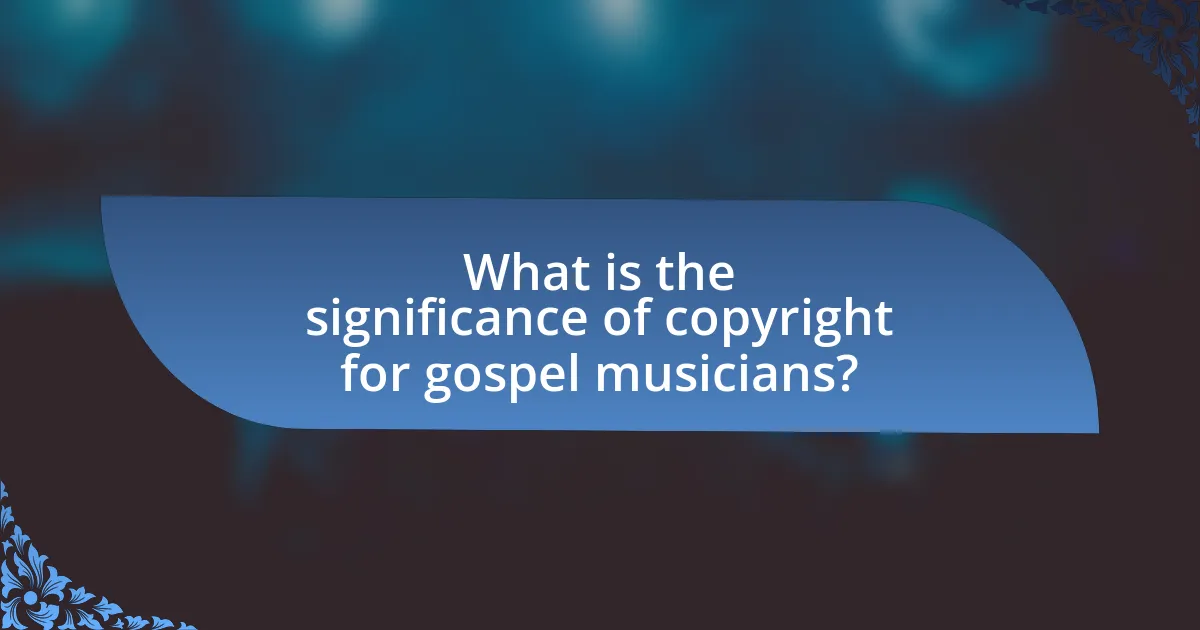
What is the significance of copyright for gospel musicians?
Copyright is significant for gospel musicians as it protects their original works from unauthorized use and ensures they receive recognition and financial compensation for their creativity. By securing copyright, gospel musicians can control how their music is distributed, performed, and reproduced, which is crucial in an industry where their artistic contributions can be easily exploited. According to the U.S. Copyright Office, copyright grants the creator exclusive rights to their work for a duration of the creator’s life plus 70 years, thereby providing a legal framework that supports the economic viability of their music career. This legal protection encourages gospel musicians to invest time and resources into their craft, knowing that their intellectual property is safeguarded.
How does copyright protect the work of gospel musicians?
Copyright protects the work of gospel musicians by granting them exclusive rights to their original compositions, recordings, and performances. This legal framework allows gospel musicians to control how their music is used, ensuring they receive recognition and financial compensation for their creative efforts. Specifically, copyright law prevents unauthorized reproduction, distribution, and public performance of their works, thereby safeguarding their artistic integrity and economic interests. For instance, under the U.S. Copyright Act, musicians can register their works, which provides legal evidence of ownership and the ability to pursue legal action against infringers.
What types of works are eligible for copyright protection?
Copyright protection is eligible for original works of authorship fixed in a tangible medium of expression. This includes literary works, musical compositions, dramatic works, choreographic works, pictorial and graphic works, audiovisual works, sound recordings, and architectural works. The U.S. Copyright Act of 1976 specifies these categories, affirming that the work must be original and demonstrate a minimal degree of creativity to qualify for protection.
How does copyright registration benefit gospel musicians?
Copyright registration benefits gospel musicians by providing legal protection for their original works, ensuring that they have exclusive rights to reproduce, distribute, and perform their music. This legal recognition helps prevent unauthorized use or infringement, allowing musicians to control how their creations are utilized. Furthermore, registered works are eligible for statutory damages and attorney fees in case of infringement, which can significantly enhance a musician’s ability to seek compensation. According to the U.S. Copyright Office, registration is a prerequisite for filing a lawsuit for infringement, thereby reinforcing the importance of this process for gospel musicians seeking to safeguard their artistic contributions.
What are the common misconceptions about copyright in the music industry?
Common misconceptions about copyright in the music industry include the belief that copyright protects only the sound recording and not the underlying composition, and that once a song is created, it is automatically protected without any formal registration. In reality, copyright covers both the musical composition (melody and lyrics) and the sound recording, but registering the work with the U.S. Copyright Office provides legal advantages, such as the ability to sue for infringement and eligibility for statutory damages. Additionally, many assume that using a short sample of a song is permissible without permission, which is incorrect; any use of copyrighted material typically requires a license, regardless of length.
What is the difference between copyright and trademark?
Copyright protects original works of authorship, such as music, literature, and art, granting the creator exclusive rights to reproduce, distribute, and display their work. In contrast, a trademark protects symbols, names, and slogans used to identify and distinguish goods or services in the marketplace, preventing consumer confusion. The U.S. Copyright Act of 1976 governs copyright, while the Lanham Act regulates trademarks. Thus, copyright focuses on creative expression, while trademark emphasizes brand identity and consumer protection.
How does fair use apply to gospel music?
Fair use applies to gospel music by allowing limited use of copyrighted material without permission from the copyright owner under specific circumstances. This legal doctrine is particularly relevant for gospel musicians who may want to incorporate elements of existing works, such as melodies or lyrics, into their own music for purposes like criticism, comment, teaching, or scholarship. For instance, if a gospel artist uses a short excerpt of a popular hymn in a transformative way, such as creating a new arrangement or adding original lyrics, this may qualify as fair use. Courts typically consider factors such as the purpose of the use, the nature of the original work, the amount used, and the effect on the market value of the original work when determining fair use applicability.
What steps should gospel musicians take to secure their copyrights?
Gospel musicians should register their works with the U.S. Copyright Office to secure their copyrights. This formal registration provides legal protection and establishes a public record of ownership. Additionally, musicians should keep detailed records of their creations, including drafts and recordings, to support their claims. They can also consider using copyright notices on their works to deter infringement. Furthermore, joining a performing rights organization, such as ASCAP or BMI, can help in monitoring and collecting royalties for public performances. These steps are essential for safeguarding their intellectual property and ensuring they receive proper compensation for their work.
How can gospel musicians effectively register their works?
Gospel musicians can effectively register their works by submitting their music to a copyright office, such as the U.S. Copyright Office, which provides legal protection for their original compositions. This process involves completing a registration form, paying a fee, and providing a copy of the work. According to the U.S. Copyright Office, registering a work establishes a public record of the copyright and is necessary for pursuing legal action against infringement. Additionally, gospel musicians should consider joining performance rights organizations like ASCAP or BMI, which help manage royalties and ensure that musicians are compensated for public performances of their music.
What are the consequences of failing to secure copyright?
Failing to secure copyright can lead to significant legal and financial consequences for creators. Without copyright protection, individuals lose exclusive rights to their work, making it vulnerable to unauthorized use, reproduction, and distribution by others. This can result in lost revenue, as unauthorized parties may profit from the creator’s original work without compensation. Additionally, creators may face challenges in enforcing their rights in court, as the absence of copyright registration can weaken their legal standing. According to the U.S. Copyright Office, registered works are eligible for statutory damages and attorney’s fees in infringement cases, highlighting the importance of securing copyright to protect one’s intellectual property effectively.
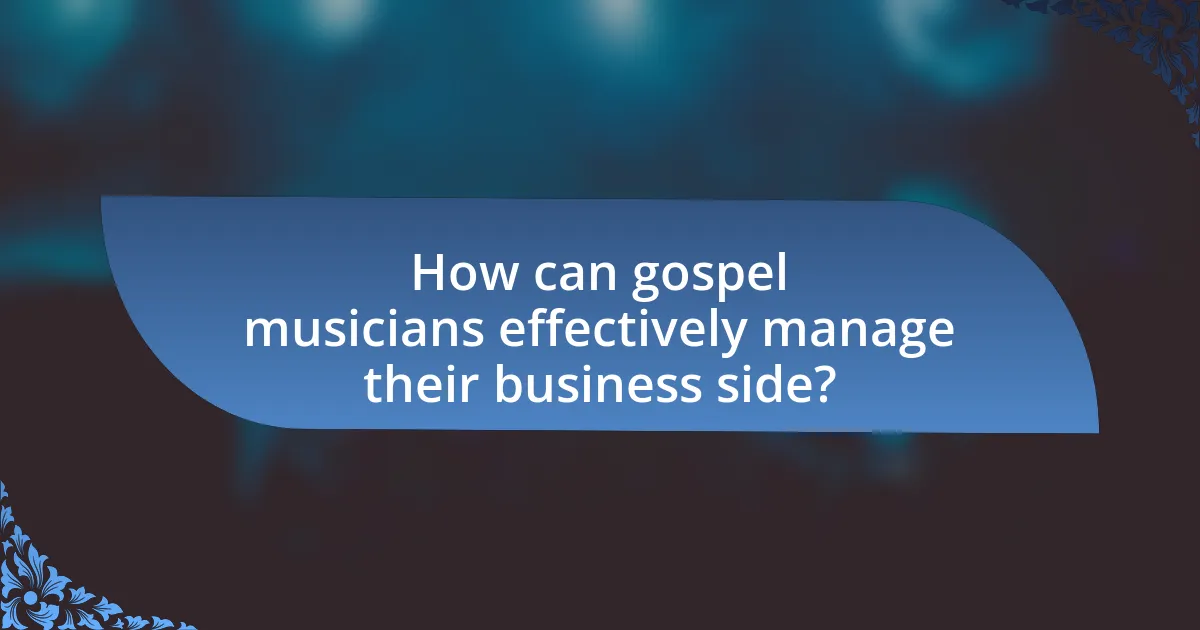
How can gospel musicians effectively manage their business side?
Gospel musicians can effectively manage their business side by implementing structured financial planning, understanding contracts, and securing copyrights. Structured financial planning involves budgeting for expenses such as recording, marketing, and touring, which can help musicians maintain financial stability. Understanding contracts is crucial; musicians should seek legal advice to ensure they comprehend the terms of agreements with record labels, promoters, and distributors. Securing copyrights protects their original music, allowing them to retain ownership and receive royalties. According to the U.S. Copyright Office, registering a copyright provides legal evidence of ownership and can enhance the ability to enforce rights against infringement.
What resources are available for gospel musicians to learn about contracts and copyrights?
Gospel musicians can access various resources to learn about contracts and copyrights, including online courses, workshops, and legal guides. Websites like Coursera and Udemy offer courses specifically focused on music law, while organizations such as the American Society of Composers, Authors and Publishers (ASCAP) provide educational materials and seminars on copyright issues. Additionally, books like “Music Law: How to Run Your Band’s Business” by Allen Bargfrede and “The Musician’s Guide to Law and Business” by Mark Halloran serve as comprehensive references. These resources equip gospel musicians with essential knowledge to navigate contracts and copyright laws effectively.
What organizations provide support and education for gospel musicians?
Organizations that provide support and education for gospel musicians include the Gospel Music Association (GMA), which offers resources, networking opportunities, and educational programs focused on the business aspects of gospel music. Additionally, the American Society of Composers, Authors, and Publishers (ASCAP) provides workshops and seminars that educate musicians on copyright issues and contracts. The National Association of Recording Merchandisers (NARM) also supports gospel musicians by offering insights into the music industry and marketing strategies. These organizations are instrumental in helping gospel musicians navigate the complexities of contracts and copyrights, ensuring they are informed and empowered in their careers.
How can online courses enhance understanding of contracts and copyrights?
Online courses can enhance understanding of contracts and copyrights by providing structured, accessible content that covers essential legal concepts and practical applications. These courses often include expert-led lectures, interactive modules, and real-world case studies that clarify complex topics such as licensing agreements and intellectual property rights. For instance, a study by the Online Learning Consortium found that 70% of students reported improved comprehension of legal principles after completing online courses focused on contracts and copyrights. This evidence supports the effectiveness of online education in demystifying legal frameworks for individuals, including gospel musicians, who need to navigate these areas in their careers.
What best practices should gospel musicians follow in managing contracts and copyrights?
Gospel musicians should prioritize understanding and negotiating their contracts and copyrights to protect their creative work and financial interests. This includes thoroughly reviewing all contract terms, ensuring clarity on rights and obligations, and seeking legal advice when necessary. Additionally, gospel musicians should register their works with copyright offices to establish ownership and protect against infringement. According to the U.S. Copyright Office, registering a copyright provides legal advantages, including the ability to sue for damages in case of infringement. Furthermore, maintaining organized records of contracts and communications with collaborators can prevent disputes and facilitate smoother management of rights.
How can gospel musicians keep track of their contracts and copyright registrations?
Gospel musicians can keep track of their contracts and copyright registrations by utilizing digital management tools and maintaining organized records. Digital platforms such as cloud storage services allow musicians to store and categorize contracts and copyright documents, ensuring easy access and backup. Additionally, using contract management software can help track deadlines, renewals, and obligations associated with each contract. According to the U.S. Copyright Office, registering copyrights provides legal protection and establishes a public record, making it essential for musicians to keep updated records of their registrations. Regularly reviewing and updating these documents ensures that gospel musicians remain compliant and aware of their rights and responsibilities.
What tools can assist gospel musicians in managing their business affairs?
Gospel musicians can utilize various tools to effectively manage their business affairs, including accounting software, contract management platforms, and digital distribution services. Accounting software like QuickBooks or FreshBooks helps musicians track income, expenses, and generate financial reports, ensuring accurate financial management. Contract management platforms such as DocuSign or PandaDoc facilitate the creation, signing, and storage of contracts, which is crucial for protecting rights and obligations. Additionally, digital distribution services like DistroKid or TuneCore enable musicians to distribute their music across multiple platforms while managing royalties and copyright registrations. These tools collectively streamline business operations, enhance financial oversight, and safeguard legal interests for gospel musicians.
